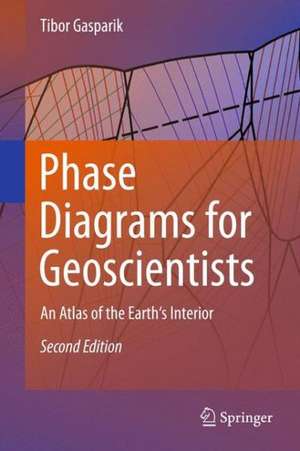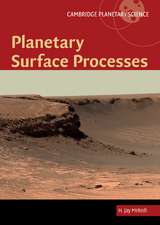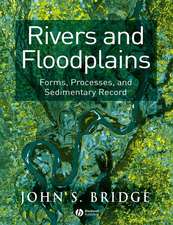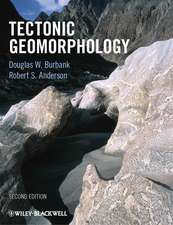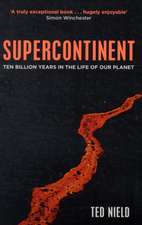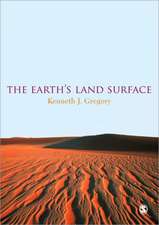Phase Diagrams for Geoscientists: An Atlas of the Earth's Interior
Autor Tibor Gaspariken Limba Engleză Hardback – 6 aug 2013
"Tibor Gasparik has devoted his career to determining the high-pressure, high-temperature phase relations of the geologically important Sodium-Calcium-Magnesium-Aluminium-Silicon (NCMAS) oxide system. This book is his opus magnum, summarizing more than 1700 experiments in over 120 figures. … I have found Phase Diagrams for Geoscientists to be a useful first port-of-call for finding the P-T stability fields … and I can recommend the book as a reference for geoscientists requiring an overview of the stable phase assemblages in the top 700 km of the Earth." (David Dobson, Geological Magazine, Vol. 142 (2), 2005)
| Toate formatele și edițiile | Preț | Express |
|---|---|---|
| Paperback (2) | 953.03 lei 6-8 săpt. | |
| Springer – 30 sep 2016 | 953.03 lei 6-8 săpt. | |
| Springer Berlin, Heidelberg – 29 noi 2010 | 1655.57 lei 6-8 săpt. | |
| Hardback (1) | 956.81 lei 6-8 săpt. | |
| Springer – 6 aug 2013 | 956.81 lei 6-8 săpt. |
Preț: 956.81 lei
Preț vechi: 1166.84 lei
-18% Nou
Puncte Express: 1435
Preț estimativ în valută:
183.08€ • 191.17$ • 151.18£
183.08€ • 191.17$ • 151.18£
Carte tipărită la comandă
Livrare economică 15-29 aprilie
Preluare comenzi: 021 569.72.76
Specificații
ISBN-13: 9781461457756
ISBN-10: 1461457750
Pagini: 462
Ilustrații: XI, 462 p. 113 illus., 112 illus. in color.
Dimensiuni: 155 x 235 x 27 mm
Greutate: 0.77 kg
Ediția:2nd ed. 2014
Editura: Springer
Colecția Springer
Locul publicării:New York, NY, United States
ISBN-10: 1461457750
Pagini: 462
Ilustrații: XI, 462 p. 113 illus., 112 illus. in color.
Dimensiuni: 155 x 235 x 27 mm
Greutate: 0.77 kg
Ediția:2nd ed. 2014
Editura: Springer
Colecția Springer
Locul publicării:New York, NY, United States
Public țintă
ResearchCuprins
1 Thermodynamic Model and Techniques .-2 System MgO–SiO2 .- 3 System MgO–Al2O3–SiO2 .- 4 System CaO–MgO–SiO2 .- 5 System CaO–MgO–Al2O3–SiO2 Undersaturated with Silica .- 6 System CaO–MgO–Al2O3–SiO2 Saturated with Silica .- 7 Systems with Na and Ca at Lithospheric Pressures.- 8 System Na2O–MgO–Al2O3–SiO2 .- 9 System Enstatite–Diopside–Jadeite.- 10 Composition and Structure of the Earth’s Interior.- 11 References .- 12 Subject Index.
Notă biografică
Professor Gasparik was born July 21, 1950, in Levice, now Slovakia. In 1973, he received a M.S. in Geology from the Komensky University, Bratislava. After moving to the United States in 1976, he commenced graduate studies at SUNY Buffalo in 1977, continuing in 1978 at SUNY Stony Brook, from where he received a Ph.D. in Experimental Petrology in 1981. He spent the next 4 years as post-doc at the University of Chicago, returning in 1985 to SUNY Stony Brook. He became Research Assistant Professor in 1986 and Associate Professor in 1989 at the Department of Geosciences, where he currently holds this position.
Textul de pe ultima copertă
Now incorporating full color phase diagrams, this book summarizes the results of the experimental studies of phase relations in the chemical systems relevant to Earth, carried out by the author in a time period of over 20 years between 1979 and 2001. It is based on 1000 piston-cylinder experiments at pressures up to 4 GPa, and close to 700 experiments carried out with a multi-anvil apparatus at pressures up to 24 GPa. This is the largest published collection of calculated phase diagrams for the chemical systems relevant to Earth. This is also the first time that the phase relations at the relatively low pressures of the lithospheric mantle, mainly applicable to the experimental thermobarometry of metamorphic rocks and mantle xenoliths, are seamlessly integrated with the phase relations of the sublithospheric upper mantle and the uppermost lower mantle, primarily applicable to inclusions in diamond and shocked meteorites.
"Tibor Gasparik has devoted his career to determining the high-pressure, high-temperature phase relations of the geologically important Sodium-Calcium-Magnesium-Aluminium-Silicon (NCMAS) oxide system. This book is his opus magnum, summarizing more than 1700 experiments in over 120 figures. … I have found Phase Diagrams for Geoscientists to be a useful first port-of-call for finding the P-T stability fields … and I can recommend the book as a reference for geoscientists requiring an overview of the stable phase assemblages in the top 700 km of the Earth." (David Dobson, Geological Magazine, Vol. 142 (2), 2005)
"Tibor Gasparik has devoted his career to determining the high-pressure, high-temperature phase relations of the geologically important Sodium-Calcium-Magnesium-Aluminium-Silicon (NCMAS) oxide system. This book is his opus magnum, summarizing more than 1700 experiments in over 120 figures. … I have found Phase Diagrams for Geoscientists to be a useful first port-of-call for finding the P-T stability fields … and I can recommend the book as a reference for geoscientists requiring an overview of the stable phase assemblages in the top 700 km of the Earth." (David Dobson, Geological Magazine, Vol. 142 (2), 2005)
Caracteristici
New full color edition The largest collection of calculated phase diagrams published so far First phase diagrams published in color The best summary of phase relations relevant to Earth The best reference for locating stability fields of assemblages relevant for thermobarometry of mantle rocks Based on the largest collection of internally consistent experimental data by the author Includes supplementary material: sn.pub/extras
Recenzii
From the reviews:
"Tibor Gasparik has devoted his career to determining the high-pressure, high-temperature phase relations of the geologically important Sodium-Calcium-Magnesium-Aluminium-Silicon (NCMAS) oxide system. This book is his opus magnum, summarizing more than 1700 experiments in over 120 figures. … I have found Phase Diagrams for Geoscientists to be a useful first port-of-call for finding the P-T stability fields … and I can recommend the book as a reference for geoscientists requiring an overview of the stable phase assemblages in the top 700 km of the Earth." (David Dobson, Geological Magazine, Vol. 142 (2), 2005)
"Tibor Gasparik has devoted his career to determining the high-pressure, high-temperature phase relations of the geologically important Sodium-Calcium-Magnesium-Aluminium-Silicon (NCMAS) oxide system. This book is his opus magnum, summarizing more than 1700 experiments in over 120 figures. … I have found Phase Diagrams for Geoscientists to be a useful first port-of-call for finding the P-T stability fields … and I can recommend the book as a reference for geoscientists requiring an overview of the stable phase assemblages in the top 700 km of the Earth." (David Dobson, Geological Magazine, Vol. 142 (2), 2005)
